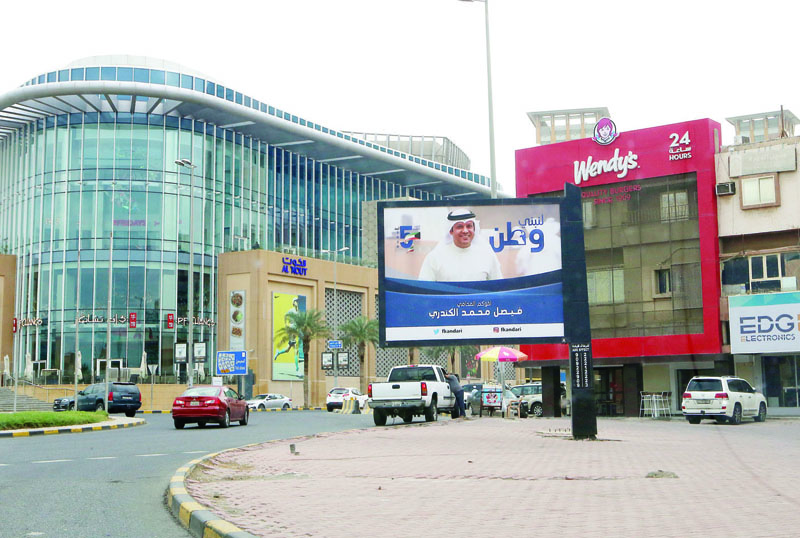
By B Izzak
KUWAIT: Political parties are banned in Kuwait and several attempts to legalize parties under Kuwaiti law have been unsuccessful. But since the inception of parliamentary life in the country in 1962, political groupings of various shades acted as de facto political parties, contested the elections and played an important role in domestic politics. From Muslim Brotherhood to Islamic Salafists, and from liberals to nationalists, political groupings held a sizable number of seats in the 50-member house and on many occasions dictated their terms.
The biggest win for the political groups was scored in the February 2012 general elections when the united opposition groupings bagged as many as 36 seats, an absolute majority for the first time, with Islamists taking over 20 seats. But that parliament was short-lived when the constitutional court in June the same year scrapped general elections on procedural grounds and ordered snap polls.

A billboard promoting third constituency candidate Abdulaziz Al-Samhan. 
A billboard promoting second constituency candidate Dr Hamad Al-Matar.
Most political groupings boycotted the next elections held in December 2012 after the government changed the voting system through an Amiri Decree. Instead of giving voters the right to elect up to four candidates under the old system, voters were allowed a single vote only, thus depriving the political parties from the capability to elect up to four MPs in each of the five constituencies. The change effectively curbed the strength of all political groupings.
But some of the political groupings later ended their boycott like the Islamic Constitutional Movement, the Salaf Islamic Alliance, the National Democratic Alliance and other opposition independents. But the nationalist Popular Action Alliance and the liberal Kuwait Democratic Forum in addition to several leading independents insisted to continue the boycott.

Billboards promoting third constituency candidate Jarrah Al-Fowzan. 
A billboard promoting third constituency candidate Osama Al-Munawer.
Main Political Groups contesting polls:
1- The Islamic Constitutional Movement (ICM), the political arm of the Muslim Brotherhood.
The group is fielding four candidates and is supporting a few others. Its candidates are MP Osama Al-Shaheen in the first constituency, Hamad Al-Matar in the second constituency, new candidate Abdulaziz Al-Saqabi in the third district and MP Abdullah Fahhad in the fourth constituency. The group is also backing MP Abdulkarim Al-Kandari in the third constituency and MP Hamdan Al-Azemi in the fifth.
Several other candidates are believed to be close to the group like Mohammad Al-Moqate, Abdullah Al-Anbuee and Khaled Al-Enezi; all in the second constituency.
The group held four seats in the outgoing assembly; Shaheen, Fahhad, Mohammad Al-Dallal who is not contesting and Jamaan Al-Harbash who was stripped of his membership after the court convicted him of storming the assembly building in 2011.
The group and its supporters are expected to bag around five seats.
2- The Salaf Islamic Alliance
The pro-government Islamist group won no seats in the outgoing assembly. Now, it is officially fielding two new candidates: Fahad Al-Masaud in the second and Yahya Al-Obeid in the third constituency. The group has announced it is backing deputy speaker Issa Al-Kandari bidding for re-election from the first constituency. It is also believed to be backing well-known Salafi activists Abdullah Al-Mutawa in the second, Waleed Al-Ghanem in the third, Khaled Al-Shulaimi in the fourth and former MPs Ahmad Al-Azemi and Humoud Al-Hamdan in the fifth constituency. The group and its supporters are expected to win around two seats.
3- The Islamic Ummah Principles Group
An alliance of hardline opposition Islamists who openly call for the implementation of Sharia Islamic law. The group and its supporters held about four seats in the outgoing assembly. This time, it is (unofficially) fielding three candidates: Former MP Osama Al-Munawer in the third, MP Mohammad Hayef in the fourth and former MP Bader Al-Dahoum in the fifth. Dahoum was disqualified by an interior ministry commission and the decision was confirmed by the lower court. He appealed against the ruling.
The group is also backing MP Adel Al-Damkhi in the first, MP Mohammad Al-Mutair in the second and MP Nayef Al-Merdas in the fifth. It is also backing former MP Jaber Al-Azemi and new candidate Saleh Al-Mutairi in the fifth constituency. The group and its supporters are projected to bag around four seats.
4- The Islamic National Alliance
The main Shiite Islamic group in Kuwait. It held two seats in the outgoing assembly. The group is fielding three candidates: MP Adnan Abdulsamad in the first, MP Khalil Abul in the third and Hussein Shams in the fifth constituency. The group is expected to maintain its strength in the next assembly.
5- Kuwait National Democratic Alliance
The liberal group held one seat in the outgoing assembly and it has not officially fielded anyone in this year's election but is solidly backing at least one candidate: Hamad Al-Ansari in the third constituency. The group is also believed to be backing a number of other candidates like former MP Hassan Jowhar in the first, MP Omar Al-Tabtabai in the second, MP Abdulwahab Al-Babtain in the third and new candidate Anwar Al-Fiker in the fourth constituency. Fiker has been disqualified and he has challenged the decision in court. The strength of these political groups in the next assembly greatly depends on their unity and coordination, otherwise they will remain scattered and largely ineffective.







